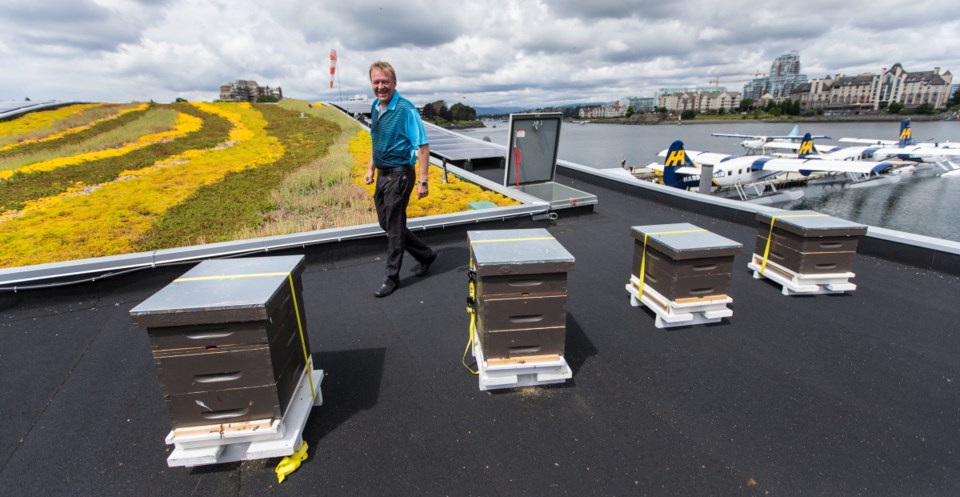There’s a new buzz in town now that four ultra-high-density housing units have gone up on the roof of Harbour Air’s floating terminal.
Four new beehives holding about 10,000 bees are now on top of the one-acre green roof. As part of the the airline’s environmental initiatives, it has also added 50 solar panels to generate electricity.
Harbour Air staff came up with both suggestions.
“First came the bee idea and then the idea of generating our own electricity to help run the airport. Once [our staff] made the business case for it, bee hives made a lot of sense,” said Randy Wright, Harbour Air Group president. “I think it is a good thing for Victoria. I think it is a good thing for the planet.”
The bees can dip into flowers of four types of native sedum plants on the roof or visit other plants downtown. They are among a growing number of bees being raised in the city centre and beyond. The Fairmont Empress, Chateau Victoria and Westin Bear Mountain hotels all set up hives a few years ago.
It is expected that Harbour Air’s bee numbers will climb to 200,000, Wright said Tuesday. Additions will be added to the hives as the population climbs.
“Harbour Air is making an important contribution to the Victoria ecosystem, ensuring we have enough bees for our plants to be pollinated, said Bill Fosdick, president of the Capital Region Beekeepers Association. Fosdick is overseeing the bees’ introduction to the roof.
“I think this will be the world’s first floating bee hive,” Fosdick said.
The bees are already producing honey. By fall, Wright is expecting to have Harbour Honey available at the terminal’s coffee area.
Anyone interested in watching the bees can go to harbourair.com to watch a new bee cam, which was expected to be in place today.
The bee cam is also featured on a new screen inside the terminal where viewers can also track the amount of electricity that the solar panels return to the grid on a daily, monthly and annual basis. The solar panels are expected to produce between 11 and 13 megawatts hours a year, depending on weather, Wright said.
Harbour Air became North America’s first carbon-neutral airline a decade ago. Benefits from the terminal’s green roof include helping to clean the air, acting as a rainwater buffer, and encouraging biodiversity in the community.
The airline says it is North America’s largest seaplane airline, carrying about 450,000 passengers a year.



